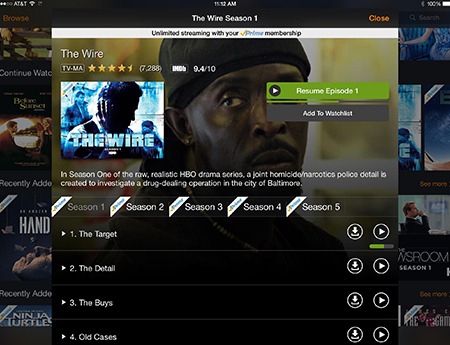Divided Over Downloading

The smarter way to stay on top of broadcasting and cable industry. Sign up below
You are now subscribed
Your newsletter sign-up was successful
Streaming might be the preferred way to watch on-demand video on mobile devices, but downloading is becoming increasingly popular in the digital realm as consumers seek out ways to watch shows and movies when they are on the go and out of range of a decent broadband connection.
Amazon recently raised its game in this area, becoming the first subscription VOD streaming service to extend a download option for iOS and Android devices, complementing initial support on its own Fire devices. That support extends to a subset of its library, including Amazon originals such as Bosch and Transparent, Starz’s The White Queen, HBO’s The Wire, and TV series such as Downton Abbey, Extant, Grimm, Hannibal and Orphan Black.
Amazon’s hybrid approach with streaming and downloading comes in stark contrast with Netflix, which continues to focus on a streaming-only distribution strategy.
And don’t expect that to change anytime soon. Cliff Edwards, Netflix’s director of corporate communications and technology, told TechRadar late last year that downloading on Netflix is “never going to happen.”
‘CONSIDERABLE COMPLEXITY’
To amplify that point, Neil Hunt, Netflix’s chief product officer, told Gizmodo U.K. last week that downloading adds “considerable complexity” that could reduce, rather than increase, usage.
Netfix’s opinion appears to be in the minority. Comcast, for example, supports downloads for a portion of its VOD library via Xfinity TV Go, its TV everywhere app. It also allows users of its X1 Cloud DVR to download and essentially “check out” recorded shows for offline viewing.
The smarter way to stay on top of broadcasting and cable industry. Sign up below
While Amazon and Netflix are on opposite sides of the downloading debate, a company that’s all-in on the concept is Penthera, a startup that has developed a video downloading platform called “Cache & Carry.”
Penthera has begun to see its business ramp up with traditional multichannel video programming distributors, programmers and over-the-top video providers. Comcast, Time Warner Cable and Charter are among Penthera’s announced partners.
Amazon’s expanded adoption spells good news for the download-focused portion of the video distribution ecosystem, Penthera CEO Michael Willner said. The cable industry veteran had been set to take the helm of GreatLand Connections, the MSO spinoff that was to emerge from the proposed (and now scuttled) Comcast- Time Warner Cable merger.
“We were encouraged by Amazon’s strong endorsement of [download] technology … [I]t’s a very smart move on their part,” Willner said. “They had some firsthand experience with the popularity of download and take-it-with-you consumption through their own device platform, and I think it was the success of that platform that gave them … the knowledge that they ought to be providing the technology for people who consume their content on other platforms.”
CONSUMERS WANT OPTIONS
Willner said the download technology sector is being driven forward as content aggregators, content owners, network operators and distributors all respond to market conditions that call on them to provide options that don’t rely solely on streaming.
“I think that offering consumers multiple ways of consuming content is a critical ingredient in solving the advanced digital-television technology world,” he said. “It’s a piece of the pie, but it’s not the whole pie.”
Penthera also is developing a version of Cache & Carry that will allow the dynamic switching of ads that would happen in the background. That addition, expected for release in 2016, will ensure that the ads in downloaded shows can remain fresh even if the user doesn’t view the show right away.
Despite Netflix’s reluctance in this area, recent research indicates that consumers are eager to have a downloading option.
Arris, in its 2015 Consumer Entertainment Index, found that most U.S. consumers view downloading as more important than streaming. Downloading was a “vitally important” option for 28% of that group, while 43% considered it “very important.” On the other end of the spectrum, 20% said downloading was “not important,” and just 9% said downloading was “not at all important.”
